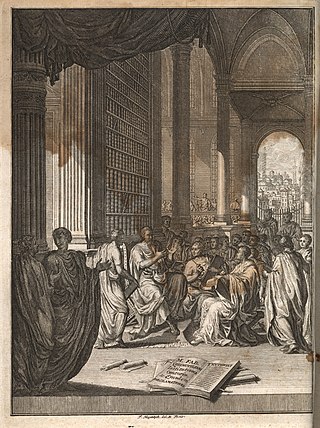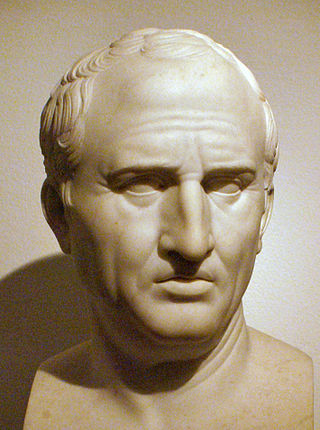
Marcus Tullius Cicero was a Roman statesman, lawyer, scholar, philosopher, writer and Academic skeptic, who tried to uphold optimate principles during the political crises that led to the establishment of the Roman Empire. His extensive writings include treatises on rhetoric, philosophy and politics. He is considered one of Rome's greatest orators and prose stylists and the innovator of what became known as "Ciceronian rhetoric". Cicero was educated in Rome and in Greece. He came from a wealthy municipal family of the Roman equestrian order, and served as consul in 63 BC.

Liberal arts education is the traditional academic course in Western higher education. Liberal arts takes the term art in the sense of a learned skill rather than specifically the fine arts. Liberal arts education can refer to studies in a liberal arts degree course or to a university education more generally. Such a course of study contrasts with those that are principally vocational, professional, or technical, as well as religiously based courses.

Rhetoric is the art of persuasion. It is one of the three ancient arts of discourse (trivium) along with grammar and logic/dialectic. As an academic discipline within the humanities, rhetoric aims to study the techniques that speakers or writers use to inform, persuade, and motivate their audiences. Rhetoric also provides heuristics for understanding, discovering, and developing arguments for particular situations.

Rodolphus Agricola was a Dutch humanist of the Northern Low Countries, famous for his knowledge of Latin and Greek. He was an educator, musician, builder of church organs, a poet in Latin and the vernacular, a diplomat, a boxer and a Hebrew scholar towards the end of his life. Today, he is best known as the author of De inventione dialectica, the father of Northern European humanism and a zealous anti-scholastic in the late fifteenth century.

Marcus Fabius Quintilianus was a Roman educator and rhetorician born in Hispania, widely referred to in medieval schools of rhetoric and in Renaissance writing. In English translation, he is usually referred to as Quintilian, although the alternate spellings of Quintillian and Quinctilian are occasionally seen, the latter in older texts.

Petrus Ramus was a French humanist, logician, and educational reformer. A Protestant convert, he was a victim of the St. Bartholomew's Day massacre.

Inventio, one of the five canons of rhetoric, is the method used for the discovery of arguments in Western rhetoric and comes from the Latin word, meaning "invention" or "discovery". Inventio is the central, indispensable canon of rhetoric, and traditionally means a systematic search for arguments.

Dispositio is the system used for the organization of arguments in the context of Western classical rhetoric. The word is Latin, and can be translated as "organization" or "arrangement".

The Rhetorica ad Herennium is the oldest surviving Latin book on rhetoric, dating from the late 80s BC. It was formerly attributed to Cicero or Cornificius, but is in fact of unknown authorship, sometimes ascribed to an unnamed doctor.
Gaius Marius Victorinus was a Roman grammarian, rhetorician and Neoplatonic philosopher. Victorinus was African by birth and experienced the height of his career during the reign of Constantius II. He is also known for translating two of Aristotle's books from ancient Greek into Latin: the Categories and On Interpretation. Victorinus had a religious conversion, from being a pagan to a Christian, "at an advanced old age".

The Five Ws is a checklist used in journalism to ensure that the "lead" or "lede" contains all the essential points of a story. As far back as 1913, reporters were taught that the lead/lede should answer these questions:

The Education of a Christian Prince is a Renaissance "how-to" book for princes, by Desiderius Erasmus, which advises the reader on how to be a good Christian prince. The book was dedicated to Prince Charles, who later became Habsburg Emperor Charles V.

De Oratore is a dialogue written by Cicero in 55 BC. It is set in 91 BC, when Lucius Licinius Crassus dies, just before the Social War and the civil war between Marius and Sulla, during which Marcus Antonius (orator), the other great orator of this dialogue, dies. During this year, the author faces a difficult political situation: after his return from exile in Dyrrachium, his house was destroyed by the gangs of Clodius in a time when violence was common. This was intertwined with the street politics of Rome.

Institutio Oratoria is a twelve-volume textbook on the theory and practice of rhetoric by Roman rhetorician Quintilian. It was published around year 95 AD. The work deals also with the foundational education and development of the orator himself.

The writings of Marcus Tullius Cicero constitute one of the most renowned collections of historical and philosophical work in all of classical antiquity. Cicero was a Roman politician, lawyer, orator, political theorist, philosopher, and constitutionalist who lived during the years of 106–43 BC. He held the positions of Roman senator and Roman consul (chief-magistrate) and played a critical role in the transformation of the Roman Republic into the Roman Empire. He was extant during the rule of prominent Roman politicians, such as those of Julius Caesar, Pompey, and Marc Antony. Cicero is widely considered one of Rome's greatest orators and prose stylists.

De Optimo Genere Oratorum, "On the Best Kind of Orators", is a work from Marcus Tullius Cicero written in 46 BCE between two of his other works, Brutus and the Orator ad M. Brutum. Cicero attempts to explain why his view of oratorical style reflects true Atticism and is better than that of the Roman Atticists "who would confine the orator to the simplicity and artlessness of the early Attic orators."

A Dialogue Concerning Oratorical Partitions is a rhetorical treatise, written by Cicero. According to the method of the Middle Academy, the treatise is sometimes described as a "catechism of rhetoric," for it is presented in the form of questions and answers. Cicero wrote it as a handbook for his young son, Marcus, and structured the text as a dialogue between the two of them.

Orator was written by Marcus Tullius Cicero in the latter part of the year 46 BC. It is his last work on rhetoric, three years before his death. Describing rhetoric, Cicero addresses previous comments on the five canons of rhetoric: Inventio, Dispositio, Elocutio, Memoria, and Pronuntiatio. In this text, Cicero attempts to describe the perfect orator, in response to Marcus Junius Brutus’ request. Orator is the continuation of a debate between Brutus and Cicero, which originated in his text Brutus, written earlier in the same year.

John of Antioch, also known as Harent of Antioch, was a 13th-century Old French writer of Outremer who made important translations from Latin. He translated Cicero, Boethius, the Otia imperialia and possibly the rule of the Knights Hospitaller. His original writing consists of an epilogue to Cicero and some additional chapters appended to the Otia.

William of Santo Stefano, in Italian Guglielmo di Santo Stefano, was an Italian nobleman, historian and patron of letters. He was an active member of the Knights Hospitaller in Outremer, northern Italy and Cyprus, where he was commander from at least 1299 until 1303.














